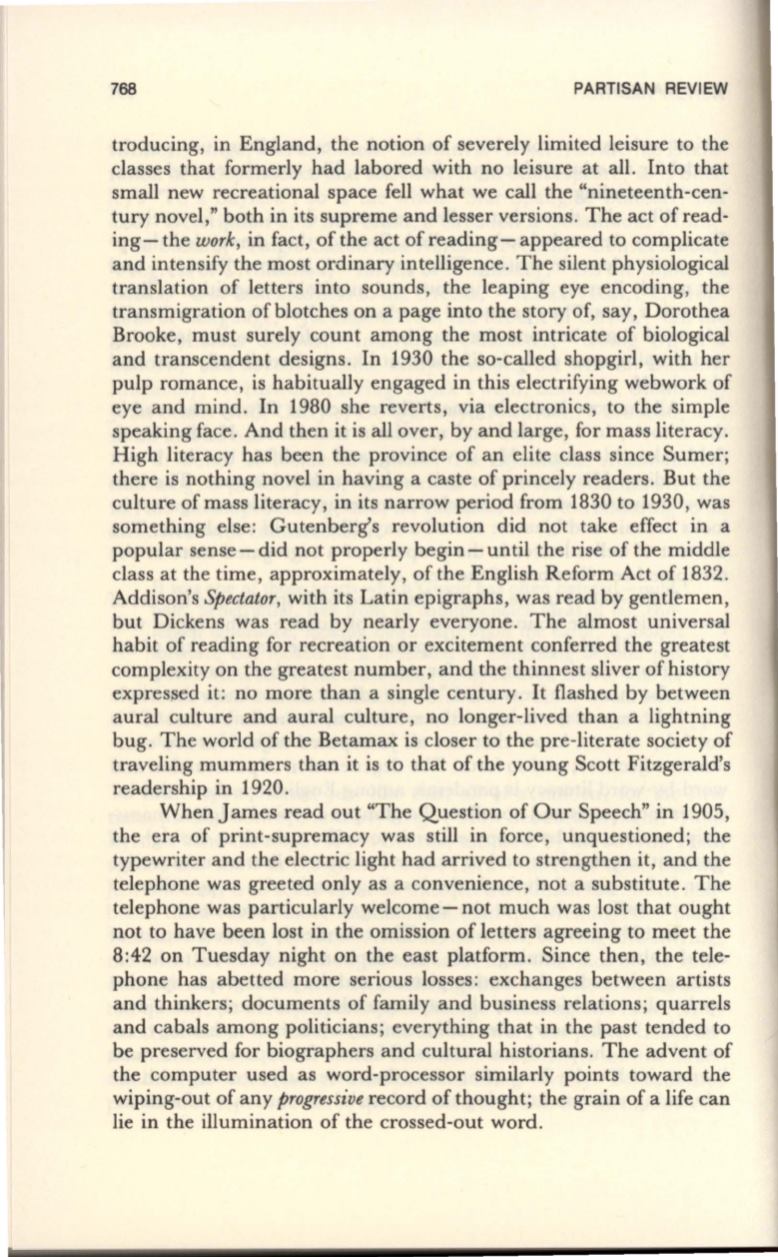
768
PARTISAN REVIEW
traducing, in England, the notion of severely limited leisure to the
classes that formerly had labored with no leisure at all. Into that
small new recreational space fell what we call the "nineteenth-cen–
tury novel," both in its supreme and lesser versions. The act of read–
ing- the
work,
in fact, of the act of reading- appeared to complicate
and intensify the most ordinary intelligence. The silent physiological
translation of letters into sounds, the leaping eye encoding, the
transmigration of blotches on a page into the story of, say, Dorothea
Brooke, must surely count among the most intricate of biological
and transcendent designs. In 1930 the so-called shopgirl, with her
pulp romance, is habitually engaged in this electrifying webwork of
eye and mind. In 1980 she reverts, via electronics, to the simple
speaking face. And then it is all over, by and large, for mass literacy.
High literacy has been the province of an elite class since Sumer;
there is nothing novel in having a caste of princely readers. But the
culture of mass literacy, in its narrow period from 1830 to 1930, was
something else: Gutenberg's revolution did not take effect in a
popular sense- did not properly begin- until the rise of the middle
class at the time, approximately, of the English Reform Act of 1832.
Addison's
Spectator,
with its Latin epigraphs, was read by gentlemen,
but Dickens was read by nearly everyone. The almost universal
habit of reading for recreation or excitement conferred the greatest
complexity on the greatest number, and the thinnest sliver of history
expressed it: no more than a single century. It flashed by between
aural culture and aural culture, no longer-lived than a lightning
bug. The world of the Betamax is closer to the pre-literate society of
traveling mummers than it is to that of the young Scott Fitzgerald's
readership in 1920.
When James read out "The Question of Our Speech" in 1905,
the era of print-supremacy was still in force, unquestioned; the
typewriter and the electric light had arrived to strengthen it, and the
telephone was greeted only as a convenience, not a substitute. The
telephone was particularly welcome- not much was lost that ought
not to have been lost in the omission of letters agreeing to meet the
8:42 on Tuesday night on the east platform. Since then, the tele–
phone has abetted more serious losses: exchanges between artists
and thinkers; documents of family and business relations; quarrels
and cabals among politicians; everything that in the past tended to
be preserved for biographers and cultural historians. The advent of
the computer used as word-processor similarly points toward the
wiping-out of any
progressive
record of thought; the grain of a life can
lie in the illumination of the crossed-out word.


